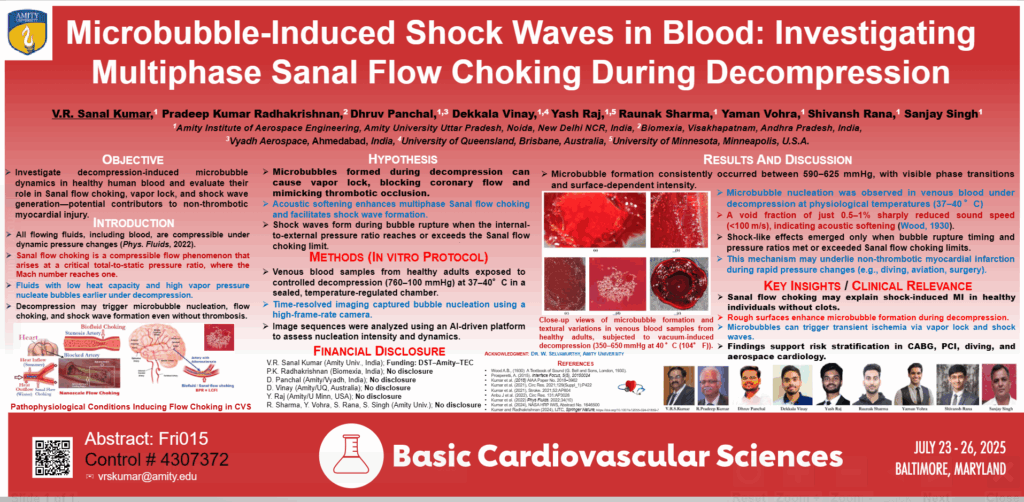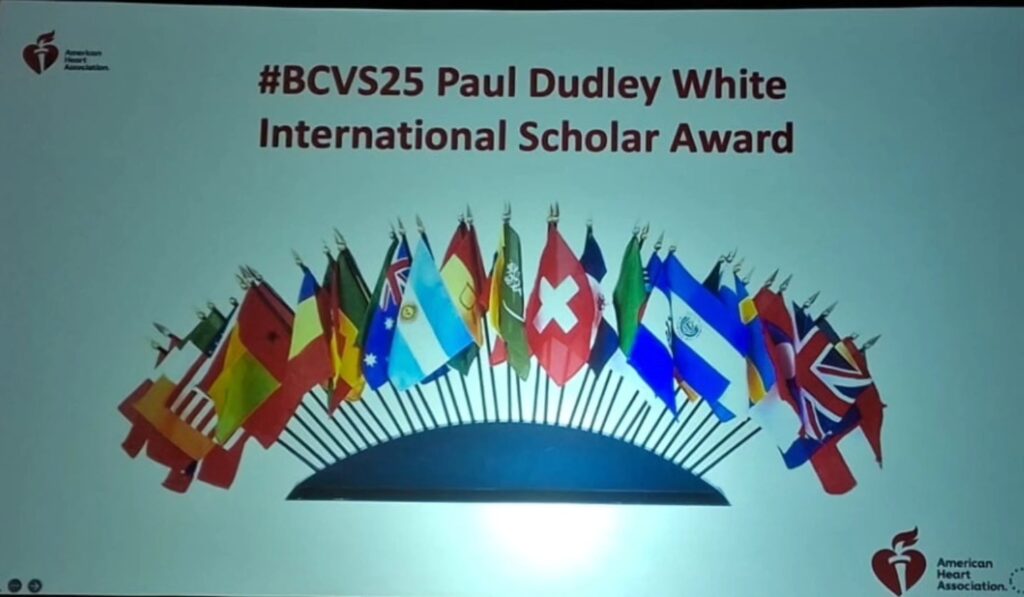The American Heart Association is reviewing its decision to give an award to the architect of a controversial theory that is the subject of eight seven retracted papers, Retraction Watch has learned. In the meantime, the researcher is using the award to contest several of the retractions.
The Paul Dudley White International Scholar Award “recognizes the team of authors with the highest-ranked scientific abstract from every participating country for each AHA scientific meeting,” according to the award website.
At its Basic Cardiovascular Sciences 2025 conference in July, the association gave the award for best abstract from India to work describing “Sanal flow choking” theory, which is named after lead author, V. R. Sanal Kumar, a professor of aerospace engineering at Amity University in New Delhi. As we have previously reported, some scientists have denounced the concept as “absolute nonsense” and “inaccurate and paradoxical” — and earlier this year, a journal said it “fundamentally violates” a law of thermodynamics.
Following the conference, Kumar sent emails to at least three journals — Scientific Reports, AIP Advances, and Global Challenges — requesting the reversal of his retractions, citing the AHA award. He copied us on those emails.
“The importance of the Sanal flow choking concept has been further validated,” Kumar wrote in the email to editors at Scientific Reports, which retracted one of his papers in 2023. “The American Heart Association recognized this work by conferring the 2025 Paul Dudley International Scholar Award.”

Kumar told us the award “reinforces the scientific credibility and translational value” of the theory.
Suzanne Grant, vice president of media relations for the AHA, told us the award “was based on abstract scores only.” She also told us “immediately” after the meeting in July, the AHA “learned of the retraction history” of Kumar. The organization was scheduled to review the award decision this week, Grant said.
Grant also said the AHA has “revised the process for the review” of future award submitters “to focus more on the quality of science rather than solely on the highest score for each country.”
In a post on Instagram on July 26, Vyadh Aerospace, for which Kumar conducts research, said the award brought the research team “A Step Closer to the Nobel Prize.”
Previous retractions don’t always get in the way of awards. As we wrote in 2018, Carlo Croce, a cancer researcher at The Ohio State University who lost several papers for image manipulation, was awarded over $300,000 from a charitable organization after decades of misconduct allegations.
Update, Oct. 23, 2025: The headline and first paragraph previously said Kumar had eight retractions. He has seven.
Like Retraction Watch? You can make a tax-deductible contribution to support our work, follow us on X or Bluesky, like us on Facebook, follow us on LinkedIn, add us to your RSS reader, or subscribe to our daily digest. If you find a retraction that’s not in our database, you can let us know here. For comments or feedback, email us at [email protected].

The authors have two recent publications on Sanal flow choking as well – one in npj Microgravity and the other in Applied Thermal Engineering. It uses the same experimental setup involving a boiling experiment with no flow and yet the authors present this as “evidence” confirming the phenomenon. If these works are also retracted, which ought to be, the count would then rise to 10.
This guy came up with a theory, turns out it probably doesn’t work. You don’t need to retract the article. We retract for fraud not because the theory was wrong. Calm down with the persecution.
Retractions are never persecution. One should retract for erroneous studies too, else the wrong ideas will percolate into the field. Of course, such retractions are now a minority with the majority of the retractions being fof fraudulent and unethical works. Nevertheless, wrong science must be flagged and the retractions of these works is precisely doing that and ensuring that readers and researchers don’t go the wrong path. It’s a theory gone wrong, but the authors aren’t accepting it and while it would be prudent for them to retract their studies that isn’t happening and hence the journals are doing it, I suppose.
“Turns out it probably doesn’t work” may be an overly generous description. This isn’t my area of expertise, but if the theory is nonsensical because it violates known physical laws, that suggests the theory never should have been published in the first place and likely should be retracted (just as a paper based on a hoax or on a well-meaning but bungled analysis likely should be retracted). Thoughtful theories that turn out to be incorrect may still be considered contributions to the field—but nonsensical theories are a different story.
Can someone please come to my aid. How does the “heart”association awarding outside of the field of medicine? What am I missing here?
Exactly my thought! A faculty from aerospace engineering doing some cardio related research. My head is shaking.
You can read the abstract yourself, it’s provided above. The authors appear to be the text-book definition of cranks but the presented work isn’t “outside of the field of medicine”. (In my experience, such conference awards are often more about how you present and not what you present.)
After AIP appointed an Interim Editor-in-Chief for Phys. Fluids in May, they’ve finally retracted, in August, 3 of these papers that they didn’t properly peer review.
https://pubs.aip.org/aip/pof/article/37/8/089905/3358467/Retraction-Universal-benchmark-data-of-the-three?searchresult=1
https://pubs.aip.org/aip/pof/article/37/8/089903/3358468/Retraction-The-theoretical-prediction-of-the?searchresult=1
https://pubs.aip.org/aip/pof/article/37/8/089904/3358527/Retraction-In-vitro-prediction-of-the-lower-upper?searchresult=1
Are these retractions counted above? They are not in the RW database as far as I can tell.
The count did include these papers, which we reported on in June: https://retractionwatch.com/2025/06/10/physics-of-fluids-aip-publishing-sanal-kumar-journal-retraction-thermodynamics/
We made an error and double-counted one of the retractions in another journal. We’ve updated the headline and first paragraph to correct the count to seven. A list is linked in the correction note.
Physicists do have a sense of humor:
From the retraction notice (last link in ICCs post):
“Post-publication assessments by subject matter experts found that there were critical flaws in the theory and analysis. Specifically, whereas this paper assumes that blood behaves like an ideal gas and hypothesizes that it flows at supersonic speeds, all experimental evidence shows that blood is effectively incompressible and flows at speeds far below that of sound. The concept of flow choking is therefore irrelevant to blood flow and cardiovascular disease.”
Application of this theory to a liquid (like blood) is thus non-sensical.
Would be interesting to see how the American Heart Association would act on the issue, given that the work seems to be very shaky and related studies have been retracted for violation of fundamental principles. Looking forward for updates.